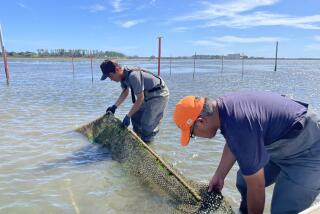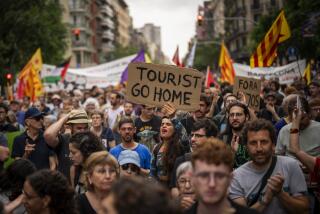Labor, Government Stances Harden in French Rail Conflict
- Share via
PARIS — Striking railway workers and the French government hardened their positions Friday in a dispute that has crippled the country’s rail network and posed a major challenge to Premier Jacques Chirac’s administration.
The labor unrest, which has also caused stoppages in French ports and on the Paris subway, threatened to spread as the Communist-led General Labor Confederation called for meetings Monday of workers in the public sector and nationalized industry to decide on future action.
The 16-day-old rail dispute and fears of wider strike action have already helped drive down the French franc against the West German mark, and these concerns hit the Paris Bourse Friday, sending share prices dipping sharply across the board.
Striking train drivers kept up the pressure, blocking tracks and occupying signal boxes in Paris and elsewhere.
Action by Police
Riot police were called in by the state-owned SNCF railway authority to clear lines in the capital, as well as at Nancy in the east, Marseilles on the south coast and a number of other stations. At the Gare de Lyon in Paris, riot police lined the platform to allow a high-speed train to set off for the southern city of Lyon.
So far there have been no violent incidents.
Shortly before the start of a meeting of the strikers’ national coordination committee to discuss future strategy, Transport Minister Pierre Mehaignerie told French television that the government-appointed mediator had made great efforts to find a solution to the conflict and that if the strike continued it was more for political reasons.
He held out hopes for further talks on working conditions but said, “There is no possibility of negotiations on pay.”
Strike to Continue
Railwaymen across France voted Friday to continue the strike, although the mediator met their chief demand on Wednesday when he announced the scrapping of a new system of advancement stressing merit rather that seniority.
“General meetings of strikers were virtually unanimous in voting to pursue the strike,” the coordination committee said in a statement.
The committee, which stands outside normal trade union structure and reflects a surge of grass-roots militancy, said that railwaymen would not return to work until they won pay increases and payment for days lost in the dispute.
“Because the SNCF and the government have so far refused to listen, railwaymen will make themselves heard more strongly,” the statement said.
The committee also called for a protest demonstration outside the Transport Ministry on Monday and a mass march in Paris on Wednesday.
‘Whole-Hog Extremists’
Rejecting the possibility of any pay increases above the 1.7% so far offered, Deputy Transport Minister Jacques Douffiagues said that “ultras and whole-hog extremists” were exploiting the dispute for political ends.
“Some railwaymen now want to return to work, and this is why the extremists have hardened the movement,” he added.
In a surprise move Thursday, Socialist President Francois Mitterrand, who was forced to share power with Chirac when his party lost parliamentary elections last March, met a delegation of striking railwaymen.
This decision prompted criticism from the right. Jacques Toubon, general secretary of Chirac’s Rally for the Republic party, said Thursday night, “This is an affair which concerns only the government and this intervention risks increasing the difficulties of the situation.”
Active Role Urged
Mitterrand has adopted an increasingly high profile on this and other social issues. He supported the students in their opposition to planned changes and urged Chirac to take a more active role in the rail dispute.
The student and rail conflicts, together with stoppages on the Paris metro and in French ports and threats of action by electricity staff and workers at state-owned automobile maker Renault, have dented the popularity of Chirac and public confidence in his government.
More to Read
Sign up for Essential California
The most important California stories and recommendations in your inbox every morning.
You may occasionally receive promotional content from the Los Angeles Times.












